LATEST NEWS
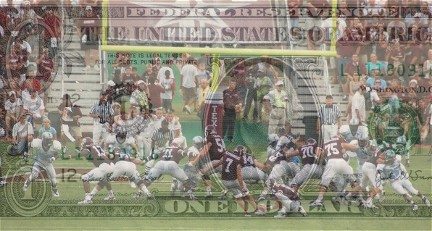

The L.A. Times had two interesting pieces on college football this last season. The second (don’t worry, I’ll get to the first), is an editorial calling on the NCAA to reform the sport by improving conditions for the so-called amateurs who generate millions of dollars every Saturday.
The piece calls for some sensible and straight-forward steps, largely echoing the basic demands of the National College Players Association, a project sponsored by the United Steelworkers.
Its heart, however, comes from a fantastic piece in The Atlantic by Taylor Branch, best known for his trilogy of books about the civil rights movement; if you haven’t read them, your life is incomplete. That gives him a certain moral authority in describing what he calls “The Shame of College Sports.” Go read this piece. It’s long, but worth it.
Okay, it’s long,
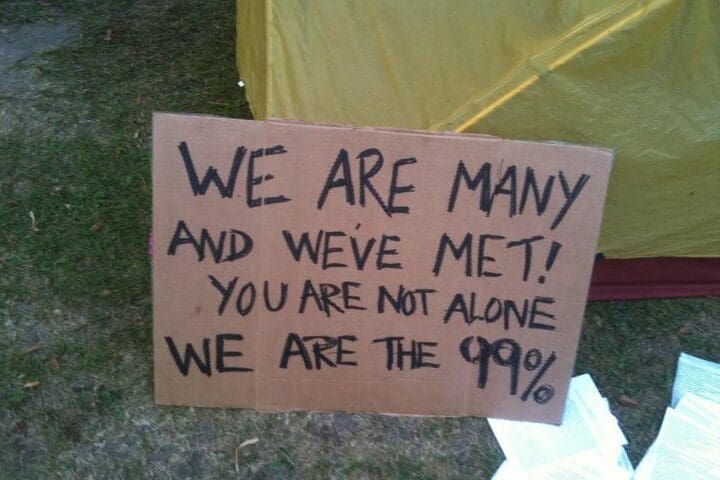
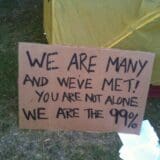
After visiting a few times, I decided to go for broke and join the occupation to see it all first hand. It was very interesting to entertain the misconceptions people might have about this movement. Some may think it’s populated by arrogant 20-somethings looking for attention and a party atmosphere with leftovers from Burning Man and Coachella attendees. Some may think it’s a few leftist apologists and homeless people intermingling uncomfortably. Some may think it’s a breeding ground for anti-American anarchists and communists plotting the takedown of our infrastructure. Others think it’s just a passing fad like pointy shoes and Bedazzler jackets.
I had some of these misconceptions myself. I didn’t know what to expect, but I had to reject these doubts before I could really see what was taking place. I visited during a Demands Committee meeting and the General Assembly, the nightly gathering for decision-making, to get a better reading of what was taking place.
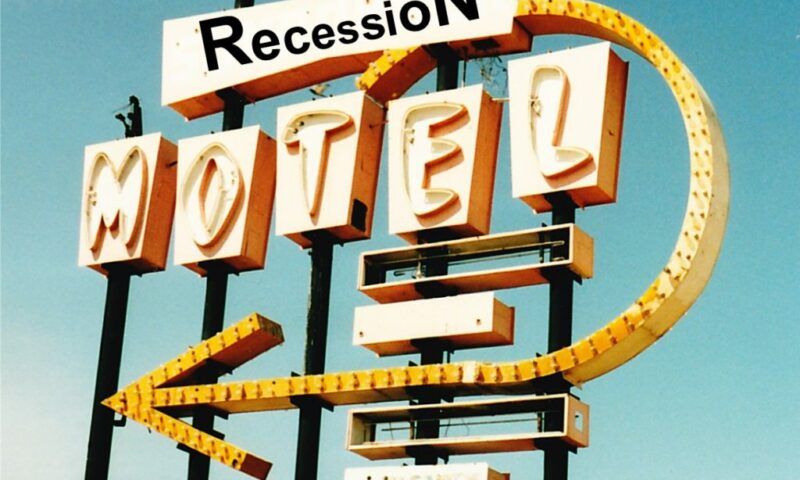
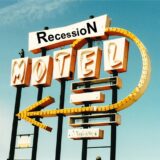
Confession time: I went to Arizona. Mea Culpa. I know I signed a pledge that I wouldn’t go there because of their anti-immigration laws, but then I got a call from my cousin asking us to join a family reunion in the mountains above Phoenix, so we went.
My wife Susan and I took the long way. We went through Flagstaff. Several years ago when we regularly drove to a retreat center in northern New Mexico, we discovered the cheap motels east of downtown, along old Route 66, across the road from train tracks that run 50 – 60 trains a day out of L.A. to the Midwest and back.
So we retraced our steps in Flagstaff and looked for one of our old motels. Except that when found, they looked worse for the wear. We tried to check into one but the manager just laughed at us, and handed us a key to look things over.
» Read more about: Great Divides: How the Other Thirds Live »
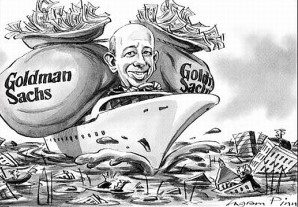
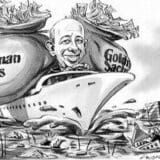
What’s fueling the ire behind the Occupy Wall Street protests that have spread from Manhattan’s financial district to cities in every state of the country and around the world? For starters, a certain corporation that 99 percent of us bailed out received $23 billion from the government but only paid one percent of its 2008 income in taxes after raking in $2.3 billion in profit.
And a new Salon.com story by Andrew Leonard, “Employers’ New Ruse: ‘Independent Contracting,” may help expose another master scheme in which Lloyd Blankfein and Goldman Sachs’ tax-avoidance maneuvering runs amok, only this time, the industry they’re manipulating isn’t banking – it’s global shipping transportation and the tens of thousands of port truck drivers that keep our economy moving.
Salon.com tells the story of Leonardo Mejia, a truck driver for Shipper’s Transport Express, a subsidiary of the massive container terminal operator SSA Marine.
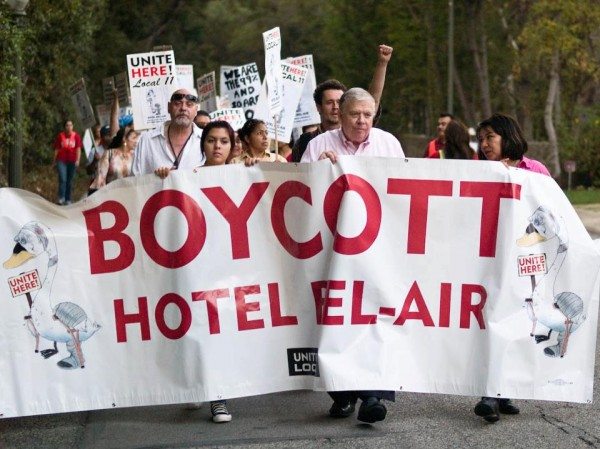

I hung up the phone and got queasy. Leigh Shelton, the press spokesperson for Local 11 had just asked me if I wanted to MC the rally after the protest at the Hotel Bel-Air on Stone Canyon Road. I’m a dues -paying member of Unite Here, the hospitality workers union, but I never thought I’d be asked to do something like this.
My natural response to doing things that scare me is to say No, and then to inform the person that I would not be the right one for the job, that indeed I might be terrible. My excuse for not wanting to do this was imbedded in a traumatic comedy club experience where I thought I would give the MC position a chance. I can still see a few heckling faces in the audience to this day.
However, Leigh convinced me that it would just involve a few talking points and introducing a few key people.
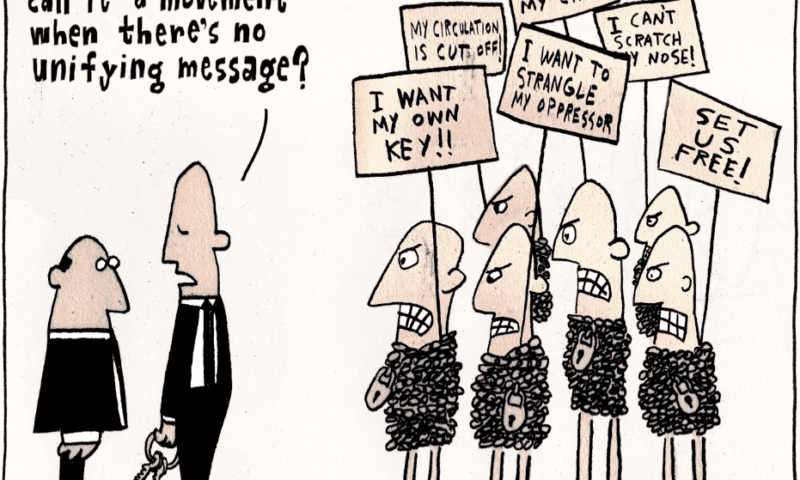
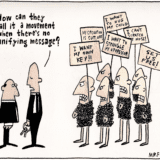


Last April, I went to visit my 25-year-old son, Armando, who lives in El Salvador. Armando – who is half Salvadoran – has been living in the capital, San Salvador, for the past two years, trying to make it as a freelance artist. When I got down there, I decided right away that I wanted to buy a car seat for cute, little three-year-old Alfonso (the son of Armando’s then-girlfriend), who was riding around in the car “freestyle” so to speak, with some pretty crazy Salvadoran drivers making me nervous.
Armando reassured me 10 ways to Sunday that he was a “careful” driver and that Salvadoran law did not require car seats for kids. Laws aside, I was determined to do the right thing and get a car seat so Alfonso could be a little safer.So began my week-long quest to find a car seat in a country where the decision to strap in your child is left to the “common sense” of the citizenry.
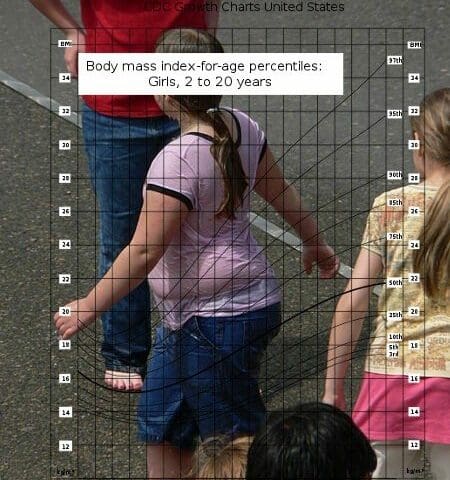

An apple a day and eating your peas led to good health, we once thought. Now, according to major food manufacturers, fruits and vegetables are “job killers” that will devastate the American economy.
In April of this year, the Federal Trade Commission, along with three other Federal agencies (FDA, CDC and USDA), released a set of proposed guidelines for marketing food to children to reduce sugars, fats and salts in the diets of American youth, and increase fruits, whole grains and vegetables. In 2008 Congress, led by Senators Sam Brownback (R-KS) and Tom Harkin (D-IA), asked for these recommendations to address the nations’ growing childhood obesity crisis.
A coalition of major manufacturers of processed foods (including Fruit Loops, Lucky Charms and SpaghettiOs), fast-food chains and the media industry that depends on their advertising dollars are spending millions on lobbyists to derail the proposed voluntary guidelines.
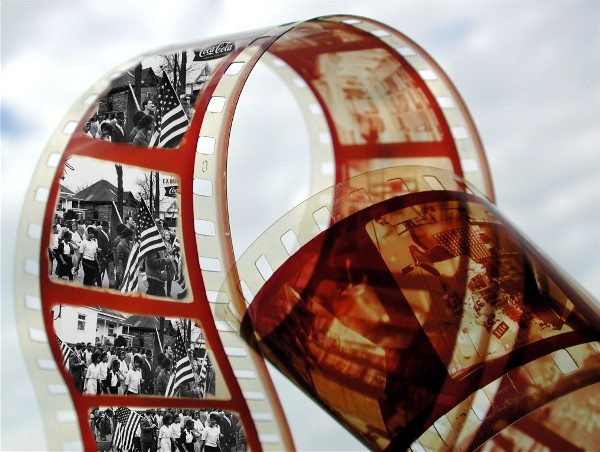

(Editor’s Note: Yesterday Peter Dreier compared this year’s breakout film, The Help, to an earlier but more accurate Hollywood portrayal of the civil rights movement. Today Vivian Rothstein, a veteran of the Mississippi Freedom Summer, weighs in with comparisons of her own.)
From watching the recent box-office hit, The Help, you’d think the women’s liberation movement had triumphed by 1963, when the film is set. In the story, white women appear to be the primary enforcers of racial segregation; it would also seem that white and black women, working without any organizational support, can profoundly change social conditions — and that white women make the top decisions in literary publishing houses. None of which was true back when I went South to work in the 1965 Mississippi Freedom Summer project.
Men are nearly invisible in the film – so is the Jim Crow power structure that allowed Southern white men to perpetuate unequal school districts,


My dog sitter, Lezle Stein, is on fire. Let me be more precise. Lezle is a dog trainer, a shelter volunteer, animal advocate and a small business owner. She’s one of many who have been dealt a blow by this so-called recovery. When I drop off my whippet in the morning, we often check in. Lately, it’s been gloomy. There’s not been a class in weeks for Lezle to teach. She’s digging into her retirement savings. She’s looking for work to supplement her business income.
Suddenly, a week or two ago, she got a new lease on life. She had discovered Occupy L.A.. Her Facebook page lit up. She was watching movies about the labor movement. “I’m going to invite you to a meeting,” she warned one evening when I called to make arrangements for a dog drop-off.
So I went down to L.A. City Hall last Thursday to see what it was all about.


David Shoemaker, writing as The Masked Man on the sports site Grantland, describes a recent storyline on the professional wrestling TV show Raw, in which wrestlers and other employees walked off the job. The Masked Man sets off the fictional labor uprising against the actual – and unsurprisingly colorful – history of labor grievances in professional wrestling.
In one instance, wrestler and future Minnesota governor Jesse “The Body” Ventura attempted to organize a union, though he got little traction among fellow wrestlers. It was later revealed that Hulk Hogan had ratted him out to Vince McMahon. Ventura later won a significant lawsuit against his employers.
More recently, the Masked Man writes, “In 2008, three wrestlers — Raven, Chris Kanyon, and Mike Sanders — sued WWE for ‘cheating them out of health care and other benefits’ and insisted that the ‘independent contractor’ designation was a sham since WWE had ‘virtually complete dominion and control over its wrestlers.’”
The sham “independent contractor” designation is a serious issue for workers in more than a few industries.
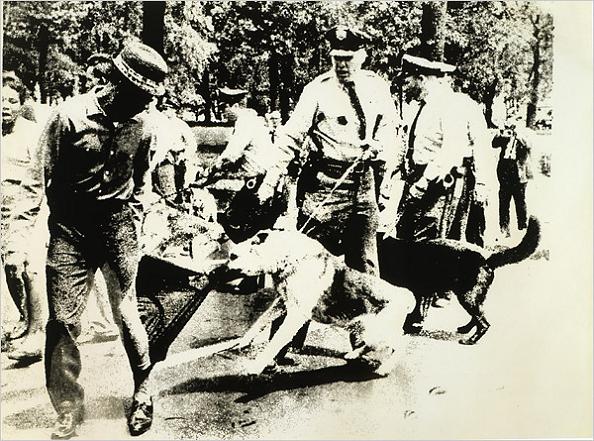
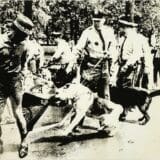
(Editor’s Note: The Help, a Hollywood film set in the Deep South during the civil rights struggle, recently scored box office gold. It seemed a rare moment in which social activism was successfully married to commerce. But was historical accuracy sacrificed for popularity – especially to reach white audiences? Two veteran political activists discuss The Help and put it in context. Today Peter Dreier compares this movie with the lesser known The Long Walk Home. Tomorrow: Vivian Rothstein, who participated in the Mississippi Freedom Summer, offers another view of The Help.)
Film director Tate Taylor scored a late-summer box office smash with his adaptation of Kathryn Stockett’s novel, The Help. A surprise hit with movie critics, too, The Help is set during the racial battles of 1963. It focuses on the efforts of African American maids to maintain their dignity despite the routine discrimination and vicious slights they confront while living in segregated Jackson,
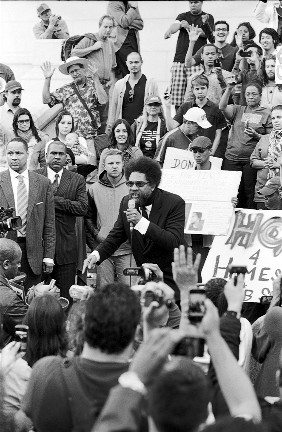
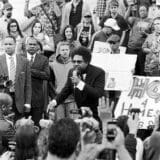
As Occupy Wall Street approaches its one-month anniversary, protest zones have been spontaneously set up from Los Angeles to Washington, D.C. Familiar bylines in America’s newspapers and on its blogs have, accordingly, been trying to explain the events.
1. The New Yorker’s Hendrik Hertzberg tries, in this week’s Talk of the Town opener (“A Walk in the Park”), not to sound too much taken in by the spirit of the protest, while at the same time acknowledging the charm of its spontaneity: “They’re making it up on the fly. They don’t really know where it will take them, and they like it that way. Occupy Wall Street is a political project, but it is equally a cri de coeur, an exercise in constructive group dynamics, a release from isolation, resignation, and futility. The process, not the platform, is the point. Anyway, [it] is not the Brookings Institution.”
Whew!


At this very moment, Los Angeles has no professional football team and hasn’t since the Raiders and Rams both left in 1995. No club in the NFL has publicly acknowledged that it would consider moving here, although there’s always talk. Yet the Anschutz Entertainment Group has an ambitious project vying to be the home of a future Los Angeles football team, one that the city itself should push to have a stake in.
Rumors of an L.A. move have ballooned over the past year. Specifically, the San Diego Chargers have emerged as the most likely NFL team to move here, where they played their first season in 1960. They currently have a year-to-year lease at Qualcomm Stadium, which flooded last December. Their new stadium would be AEG’s yet-to-be-built Farmers Field in downtown, a large, open venue with a sleek design and a retractable roof. The economics are big, too. It is projected to hire between 20,000 and 30,000 people,


As I parked the car near the Gudiel family house on Proctor Avenue, in an unincorporated part of the San Gabriel Valley, I suddenly remembered that I forgot to tell my wife that there was a possibility that I could be arrested on this day. She’s gotten used to my activism as of late, but I suppose the wise thing to do would’ve been to ask her to keep her phone close by.
It was my first sit-in of any kind, and the first thing I noticed upon entering the side entrance was a crude set of tents propped up in the front yard that friends, neighbors and union activists had put up for a round-the-clock vigil. Spot, the family dog, greeted me at the gate with a fast wagging tail.
Due to my negligence of laundry for the past week, I was a bit overdressed, and received suspicious looks from the 8 to10 people clustered at the front door.


These days people complain a lot about government. Our California state legislature continuously gets low marks for (not) getting things done. But as the October 9 deadline passed for Gov. Jerry Brown to sign or veto legislation passed by our state lawmakers, I decided to check on the state legislative analyst site to see what Sacramento actually did this year. (You can check bills here yourself.) I was amazed. Despite a less-than-perfect process for including the voices of all Californians, our legislators got a huge amount accomplished in 2011.
Now I know that a lot of people are worried that politicians make too much money, have too many perks, skate the edge of good ethics and high integrity. But I think that our state senate, headed by Sen. Darrell Steinberg (D-Sacto), and our state assembly, headed by speaker John Perez (D-L.A.), deserve some constituent love. You guys did a great job this year.
» Read more about: Sacramento Scorecard: A Legislative Tally »
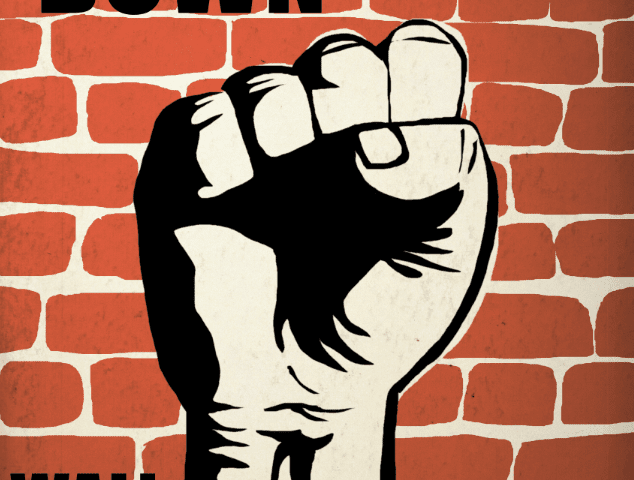



The protesters challenging the big banks and the super-rich won a dramatic victory in Los Angeles on Thursday, as I describe below. OneWest Bank, the biggest bank based in Southern California, and Fannie Mae, stopped their foreclosure and eviction against Rose Gudiel, a working class homeowner, in response to a brilliantly executed protest movement by community and union activists.
The question facing the activists is this: Is the Occupy Wall Street phenomenon a moment of protest or a movement for sustained change? Will Rose Gudiel become the Rosa Parks of a new economic justice movement?
As I write in The Nation (in the October 24 issue, now on-line), “If the Occupy Wall Street activists join forces with the unions and community groups, they could catalyze a massive nationwide movement to resist foreclosures and block evictions. They could also put pressure on local and state lawmakers to pass tougher legislation.
» Read more about: Occupy America! Pushing a Moment into a Movement »
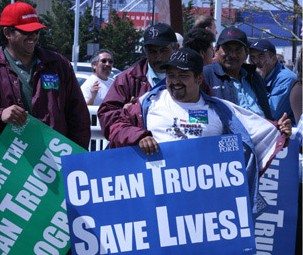
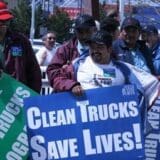
For years, NRDC, working with allies in labor, have disproved the myth that environmental protection and good jobs can’t co-exist. We are not alone in this: NRDC, Sierra Club, National Wildlife Federation and Union of Concerned Scientists are members of the BlueGreen Alliance, which also includes the Steelworkers, United Auto Workers, SEIU and other national and international unions representing tens of thousands of members.
NRDC has focused particularly on promoting the new clean energy economy which brings with it good-paying, local jobs in the manufacturing, construction and service sectors. We have seen this in California where the clean energy sector is growing faster than any other sector, accounting for over 90,000 in Los Angeles area alone. This is apparently news to the Los Angeles Times. In a misguided editorial on the recent Ninth Circuit ruling in the Port of Los Angeles clean trucks case,
» Read more about: Wake Up, L.A. Times, It’s a Blue-Green World »
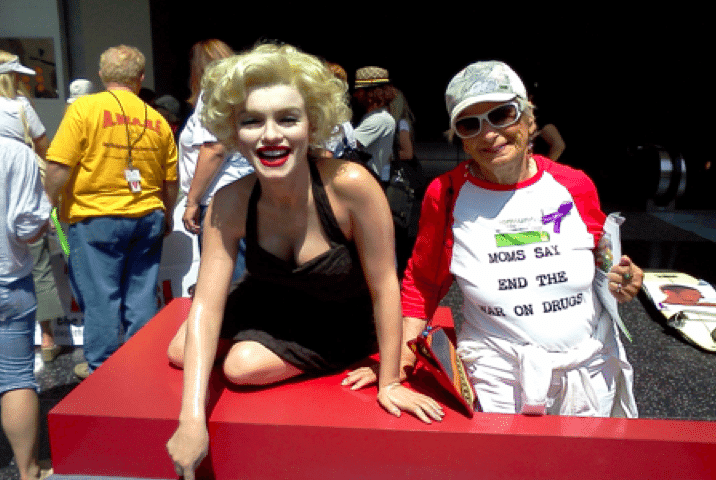

Oh, the 1960s!
Back then I was one of those middle-class married women who never dreamed of a career. Then came Betty Friedan and The Feminine Mystique. And so in my early 40s, I enrolled in the University of Pittsburgh’s School of Social Work master’s degree program.
On the very first day of class my professor wrote on the blackboard, “Social workers believe in ambivalence.” I was home. I had always been uncomfortable with unalterable truths — generalized philosophies and rules and theories that were supposed to apply across time, place and circumstances.
Now that, 50 years later, there is so much attention being paid to aging (and it’s me the experts are referring to in their speculations), I’ve become weary of all the guarantees being offered for a healthy, long — and I do mean long — happy life.